SINOPSIS
Ella se llama Nora, es musulmana. Él se llama Christophe. Estan enamorados. Se casan. Ella queda embarazada. Pero una noche, el demonio del cerdo despierta a Nora.
En adelante, pasara sus dias entre su obsesión por las vidrieras de las fiambrerias y rezos expiatorios. En cuanto al pobre marido, consultará desesperadamente a un iman e incluso a un rabino para ayudar a su esposa. Pero, con qué éxito? ...
Elle s’appelle Nora. Il s’appelle Christophe. Ils s’aiment. Ils se marient. Elle tombe enceinte. Mais une nuit, lé démon du cochon réveille Nora. La musulmane va désormais passer ses journées entre léchage de vitrines au rayon charcuterie et prières expiatoires. Quant au pauvre mari, il consultera désespérément les imams et même un Rabbin pour aider sa femme. Avec quel succès ?...
BIOGRAFÍA
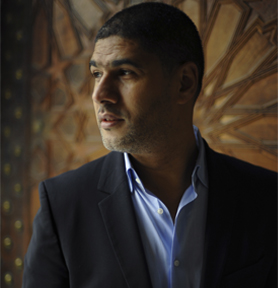 Rachid Benzine enseña filosofía y ciencias islámicas en Francia. Nacido en 1971 en Marruecos, creció y estudió en la región parisina. Después de colaboraciones con varios directores (Julian Schnabel de Estados Unidos, Rachid El Ouali de Marruecos y más), dedica la mayor parte de su tiempo escribiendo obras de teatro y guiones. La Revelación del Cerdo es su primer cortometraje como guionista y director.
Rachid Benzine enseña filosofía y ciencias islámicas en Francia. Nacido en 1971 en Marruecos, creció y estudió en la región parisina. Después de colaboraciones con varios directores (Julian Schnabel de Estados Unidos, Rachid El Ouali de Marruecos y más), dedica la mayor parte de su tiempo escribiendo obras de teatro y guiones. La Revelación del Cerdo es su primer cortometraje como guionista y director.
Rachid Benzine teaches philosophy and Islamic sciences in France. Boen in 1971 in Morocco, he grew up and studied in the Parisian outskirts. After collaboration with several directors (Julian Schnabel from the USA, Rachid el Ouali from Morocco and more) he spends most of his time writing theatre plays and scripts. La révélation du Cochon is his first short feature as a scriptwriter and director.
SINOPSIS
En 1969, Lahcen se reúne con su amigo Omar, enfermero en Tánger. Pagan sus cuentas jugando en el Casino. Cuando Omar se involucra en el tráfico de órganos, Lahcen decide alejarse de él y refugiarse lejos de Tánger. Omar no lo acepta y le tiende una trampa. 40 años después, Ali se entera de que su padre está arrestado. Tratando de demostrar la inocencia de su padre, se lanzará a una aventura que lo llevará del Alto Atlas a Sebta, pasando por Rabat y Tánger. Durante su periplo, se encontrará en el camino de Said, quien pensará es su hermano. ¿Hasta dónde llegarán para descubrir la verdad?
In 1960 Lahcen gets together with his friend Omar who is a nurse in Tangiers. They make ends meet gambling at the casino. When Omar gets involved in organ trafficking, Lahcen decides to distance himself from him and find shelter away from Tangiers but Omar does not accept this and sets him up. 40 years later Ali finds out that his father has been arrested. As he tries to prove his innocence, he will embark in an adventure which will take him from the High Atlas to Sebta through Rabat and Tangiers. In the course of his journey he will cross paths with Said, who he will think is his brother. How far will they get to learn the truth?
BIOGRAFÍA
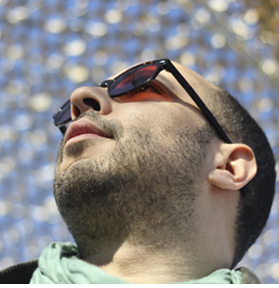 Othman Naciri nació en Casablanca en 1981. Se graduó en la ESRA, Escuela Superior de Dirección Audiovisual de París en 2004 y siguió una formación en producción en 2006 en la Media Business School de Málaga, España. Entre 2006 y 2009, Othman trabajó sobre la concepción y dirección de muchos programas de televisión y reportajes. En 2009 y 2010 dirigió dos cortometrajes: 37 kilomètres Celsius y Sin Palabras, que fueron exitosos en muchos festivales nacionales e internacionales. Su último cortometraje Sin Palabras participó en más de 50 festivales en el mundo y ganó varios premios. Fue distribuido en France Télévision en 2012. SAGA, L'histoire des hommes qui ne reviennent jamais, es su primer largometraje.
Othman Naciri nació en Casablanca en 1981. Se graduó en la ESRA, Escuela Superior de Dirección Audiovisual de París en 2004 y siguió una formación en producción en 2006 en la Media Business School de Málaga, España. Entre 2006 y 2009, Othman trabajó sobre la concepción y dirección de muchos programas de televisión y reportajes. En 2009 y 2010 dirigió dos cortometrajes: 37 kilomètres Celsius y Sin Palabras, que fueron exitosos en muchos festivales nacionales e internacionales. Su último cortometraje Sin Palabras participó en más de 50 festivales en el mundo y ganó varios premios. Fue distribuido en France Télévision en 2012. SAGA, L'histoire des hommes qui ne reviennent jamais, es su primer largometraje.
Othman Naciri was born in Casablanca in 1981. He graduated at ESRA, Ecole Supérieure de Réalisation Audiovisuelle, in 2004 and then, in 2006 he began studying production at the Media Business School of Malaga, Spain. Between 2006 and 2009 Othman worked on the conception and direction of many television programmes and interviews. In 2009 and 2010 he directed two short films: 37 kilomètres Celsius and Sin Palabras, which were very successful in many national and international film festivals. His last short film, Sin Palabras, participated in over 50 festivals worldwide and won several awards. It was distributed in France Télévision in 2012. SAGA, L'histoire des hommes qui ne reviennent jamais is his first feature film.
SINOPSIS
Maité se va a El Aaiún donde la espera Dahmane para realizar un documental sobre el Sahara marroquí. La realidad que descubre en el lugar no corresponde para nada con aquello que se había imaginado. Ella cree que Dahmane quiere influenciar su trabajo y decide irse. El día antes de su partida, se encuentra con unas personas pertenecientes a una ONG que se dirigen al desierto. Ella se les une. Y allí comienza la aventura que entre el documental y la ficción muestra la magia del desierto.
Maité leaves for El-Aaiún where Dahmane is waiting for her to shoot a documentary about the Moroccan Sahara. But she realises that reality has nothing to do with what she had imagined. She thinks Dahmane wants to influence her work and decides to leave. The day before her departure she runs into some ONG volunteers who are heading for the desert, so she joins them. And that’s when the adventure which through documentary and fiction shows the magic of the desert begins.
BIOGRAFÍA
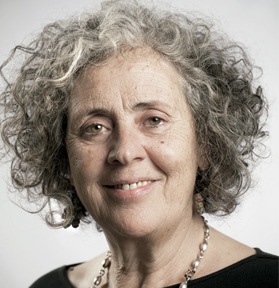 La realizadora y guionista marroquí Farida Benlyazid nació en 1948 en Tánger. Después de licenciarse en letras por la Universidad de Paris VIII, estudió cine en la Escuela Superior de Estudios Cinematográficos de París (ESEC), donde obtuvo su diploma en 1976. Un año después se beneficia de varios períodos de prácticas en cine en la capital francesa antes de volver a Marruecos a comienzos de los años 80. Empieza la dirección de películas con Identité de femme en 1979 y luego con Une porte sur le ciel en 1988 y Keïd Ensa ya en 1999. También realizó telenovelas para el canal 2M: Nia taghleb (2000) y El Boukma (2001). En 1991, crea la sociedad de producción cinematográfica Tingitania Films. Farida Benlyazid es una de las pocas mujeres directoras de África del Norte.
La realizadora y guionista marroquí Farida Benlyazid nació en 1948 en Tánger. Después de licenciarse en letras por la Universidad de Paris VIII, estudió cine en la Escuela Superior de Estudios Cinematográficos de París (ESEC), donde obtuvo su diploma en 1976. Un año después se beneficia de varios períodos de prácticas en cine en la capital francesa antes de volver a Marruecos a comienzos de los años 80. Empieza la dirección de películas con Identité de femme en 1979 y luego con Une porte sur le ciel en 1988 y Keïd Ensa ya en 1999. También realizó telenovelas para el canal 2M: Nia taghleb (2000) y El Boukma (2001). En 1991, crea la sociedad de producción cinematográfica Tingitania Films. Farida Benlyazid es una de las pocas mujeres directoras de África del Norte.
Filmmaker and scriptwriter Farida Benlyazid was born in 1948 in Tangier. After obtaining her Bachelor of Arts at the University of Paris VIII; she studied film at the College of Cinematography of Paris (ESEC), where she graduated in 1976. A year after that, she has different practices in film in Paris before going back to Morocco in the early 80s. The first movie she directs is Identité de femme in 1979 and then she continued with Une porte sur le ciel in 1988 and Keïd Ensa eleven years later. She also directed soap operas for the 2M channel: Nia taghleb (2000) and El Boukma (2001). In 1991 she created the film production society Tinfitania Films. Farida Benlyazid is one of the few film directors from North Africa.
SINOPSIS
Aicha es una mujer bereber tradicional que vive feliz con su marido a pesar de que su único hijo está enfermo de cáncer. Esto será hasta que aparezca Eva, una turista europea totalmente fascinada por Soleiman ─el marido de Aicha. Frente a esta situación, Aicha intenta proteger a su familia como puede y evitar la separación con su esposo.
Aicha is a traditionally Berber woman who lives happily with her husband despite having a child who is suffering from cancer. This is, until Eva comes along, a Spanish tourist who is completely fascinated by Soleiman ─Aicha’s husband. To deal with this situation Aicha tries as hard as she can to protect her family and to avoid separating from her husband.
BIOGRAFÍA
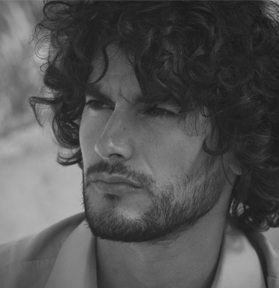 Mohamed El Badaoui nació en 1979 en un pueblo berebere llamado Boukidane en Alhucemas, norte de Marruecos. Al morir su padre cuando él tenía seis años, se le educa para trabajar como obrero, pero al poco tiempo abandonó su país para trabajar en la agricultura en La Haya (Holanda). A los 26 años, se trasladó a Madrid donde comenzó a trabajar como actor y modelo. Después se interesó por el diseño gráfico y la edición de videos. En Madrid fue por primera vez al cine. Después de muchos años en Europa, decide volver a su ciudad natal, donde filmó en 2011 Solei-man, su primer largometraje, que es a la vez su primera experiencia como guionista, director y productor.
Mohamed El Badaoui nació en 1979 en un pueblo berebere llamado Boukidane en Alhucemas, norte de Marruecos. Al morir su padre cuando él tenía seis años, se le educa para trabajar como obrero, pero al poco tiempo abandonó su país para trabajar en la agricultura en La Haya (Holanda). A los 26 años, se trasladó a Madrid donde comenzó a trabajar como actor y modelo. Después se interesó por el diseño gráfico y la edición de videos. En Madrid fue por primera vez al cine. Después de muchos años en Europa, decide volver a su ciudad natal, donde filmó en 2011 Solei-man, su primer largometraje, que es a la vez su primera experiencia como guionista, director y productor.
Mohamed was born in 1979 in a Berber town called Boukidane in Al Hoceima, in the north of Morocco. When he was six his father died and he began his education as a construction worker, but he soon left the country to work in agriculture in The Hague. At the age of 26 he moved to Madrid where he started working as an actor and as a model. He later became interested in graphic design and video editing. It was there that he first went to the cinema. After living many years in Europe, he decided to return to his native city; in whihc he filmed Solei-man in 2011. Solei-man is his first feature film, as well as his first experience as script writer, filmmaker and producer.
SINOPSIS
Samira es una joven casada que vive una vida tranquila con su marido y su hija hasta que un nuevo director es nombrado en la empresa donde trabaja. Cuando la acosa y transforma su vida en un infierno, ¿qué hará para probarlo en su contra?
Samira is a young married woman who lives a peaceful life with her husband and daughter until a new director is appointed head of the company where she works. When he harasses and transform her life into hell, what will she do to prove it against him?
BIOGRAFÍA
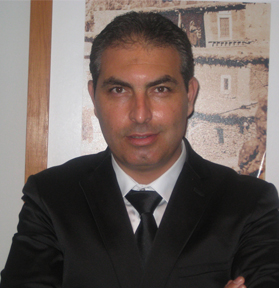 Mohamed Ahed Bensouda nació en 1969 en Tetuán, Marruecos, y estudió historia y literatura francesa en la facultad de Letras y Ciencias Humanísticas de Fez. Posteriormente, realizó trabajos como becario en distintos puestos técnicos de la producción cinematográfica. Siguió cursos de formación técnica en Cinetel, París, hasta 2003. Ese mismo año, dirigió su primer cortometraje, Le Silence violé, que recibió un premio en el Fespaco. Además, y desde 1993, trabajó como primer ayudante de dirección en unas treinta películas con directores como Claude Lelouche, Jean Delanoy, Giuseppe Tornatore y Paul Verhoeven. Asimismo, trabajó como representante de actores para varias películas internacionales y fue director de la Agencia Atlas Casting de 1997 a 2002. Actualmente, dirige la productora Les Films 7.
Mohamed Ahed Bensouda nació en 1969 en Tetuán, Marruecos, y estudió historia y literatura francesa en la facultad de Letras y Ciencias Humanísticas de Fez. Posteriormente, realizó trabajos como becario en distintos puestos técnicos de la producción cinematográfica. Siguió cursos de formación técnica en Cinetel, París, hasta 2003. Ese mismo año, dirigió su primer cortometraje, Le Silence violé, que recibió un premio en el Fespaco. Además, y desde 1993, trabajó como primer ayudante de dirección en unas treinta películas con directores como Claude Lelouche, Jean Delanoy, Giuseppe Tornatore y Paul Verhoeven. Asimismo, trabajó como representante de actores para varias películas internacionales y fue director de la Agencia Atlas Casting de 1997 a 2002. Actualmente, dirige la productora Les Films 7.
Mohamed Ahed Bensouda was born in 1969 in Tetuan, Morocco, and studied History and French Literature at the Faculty of Arts and Human Sciences in Fez. He later did work as an intern in various technical positions of film production. He continued technical training courses in Cinetel, Paris, until 2003. In the same year he directed his first short film, Le Silence violé, which received an award at the FESPACO. Moreover, since 1993, he has worked as first assistant director on some thirty films with directors of the likes of Claude Lelouche, Jean Delanoy, Giuseppe Tornatore and Paul Verhoeven. He also worked as an actors’ agent for several international films and was director of the Atlas Casting Agency from 1997 to 2002. He currently directs the production company Les Films 7.
SINOPSIS
Amine Bertale, alias Zero, es un policía de bajo rango que pasa la mayoría de su tiempo tomando denuncias y recorriendo las calles de Casablanca con Mimi, una prostituta de 22 años. Está en confrontación perpetua con su dominante padre discapacitado y su jefe, un comisario que lo humilla diariamente. Frente a esta cotidianeidad degradante e insoportable, Zero decide finalmente olvidar este pasado atormentado por la cobardía, el miedo y el complejo de inferioridad, y sale a la búsqueda de una señorita desaparecida en la gran metrópolis. Así empieza una cruzada contra un difícil y despiadado universo pervertido por el dinero y el poder.
Amine Bertale, a.k.a Zero, is a low-rank police officer who spends most of his time writing reports and wandering the streets of Casablanca with Mimi, a 22 year-old prostitute. He is constantly arguing with his dominant crippled father and his boss, a sheriff who humiliates him on a daily basis. Tired of his degrading routine, Zero finally decides to let go of this past which was tormented with cowardice, fear and an inferiority complex, and goes away in the search of a missing girl in the big metropolis. He then begins a crusade against a hard and ruthless universe that is perverted by money and power.
BIOGRAFÍA
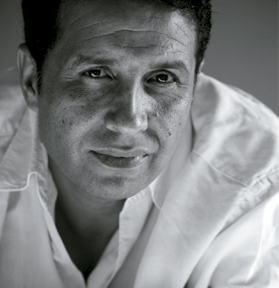 Nacido en Safi; la ciudad que dio al cine marroquí su pionero Mohamed Ousfour y otros tantos grandes directores como Mohamed Reggab, Nour-Eddine Lakhmari estudió ciencia en Marruecos y en Francia antes de embarcarse en la cinematografía en Noruega. Allí realizó cortometrajes que no pasaron por alto para los críticos. Luego de regresar a Marruecos, dirigió su primera película The Gaze en 2004, antes de llegar a los titulares con Casanegra en 2008, un verdadero fenómeno social que llegó a la cima a las boleterías locales. Ahora regresa con Zero y Black Screen.
Nacido en Safi; la ciudad que dio al cine marroquí su pionero Mohamed Ousfour y otros tantos grandes directores como Mohamed Reggab, Nour-Eddine Lakhmari estudió ciencia en Marruecos y en Francia antes de embarcarse en la cinematografía en Noruega. Allí realizó cortometrajes que no pasaron por alto para los críticos. Luego de regresar a Marruecos, dirigió su primera película The Gaze en 2004, antes de llegar a los titulares con Casanegra en 2008, un verdadero fenómeno social que llegó a la cima a las boleterías locales. Ahora regresa con Zero y Black Screen.
Born in Safi; the town that gave Moroccan cinema its pioneer Mohamed Ousfour as well as other great film makers like Mohamed Reggab, Nour-Eddine Lakhmari first studied science in Morocco and France before shifting to cinema in Norway ─where he made shorts that were noticed by the critics. After returning to Morocco, he directed his first feature The Gaze in 2004; before making headlines with Casanegra in 2008, a real social phenomenon that shot to the top of the local box office. He is now back with Zero and Black Screen.
SINOPSIS
Malika es la líder de una banda femenina de punk-rock llamada Traitors (Traidoras) que tiene una fuerte visión del mundo, su ciudad natal de Tánger y de su lugar en ella. Cuando necesita dinero para salvar a su familia de ser desalojada y para materializar sus sueños con su banda, Malika acepta una propuesta que promete dinero fácil: hacer una corrida para contrabandear drogas por sobre las montañas para un peligroso narcotraficante.
Malika is the leader of the all-female punk rock band Traitors, with a strong vision of the world, her hometown of Tangier, and her place in it. When she needs money to save her family from eviction and to realize her dreams for the band, Malika agrees to a fast cash proposition: a smuggling run over the mountains for a dangerous drug dealer.
BIOGRAFÍA
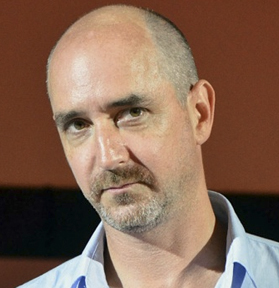 Sean Gullette es escritor, actor y director nacido en Boston. Asistió a la Universidad de Harvard, donde actuó en teatro y películas y dirigió obras de teatro. Su carrera profesional en el mundo del cine comienza en 1996, al coescribir y protagonizar la premiada película Pi, dirigida por un viejo colaborador, Darren Aronofsky. Desde entonces, ha interpretado papeles principales y secundarios en una veintena de películas. Ha sido asesor en guiones para Warner Brothers, Paramount Pictures y producciones independientes. Gullette vive en Tánger, Marruecos, y es el fundador de la Sociedad 212, una fundación estadounidense sin fines de lucro que apoya proyectos culturales y educativos de Marruecos, incluida la cinemateca de Tánger y Darna.
Sean Gullette es escritor, actor y director nacido en Boston. Asistió a la Universidad de Harvard, donde actuó en teatro y películas y dirigió obras de teatro. Su carrera profesional en el mundo del cine comienza en 1996, al coescribir y protagonizar la premiada película Pi, dirigida por un viejo colaborador, Darren Aronofsky. Desde entonces, ha interpretado papeles principales y secundarios en una veintena de películas. Ha sido asesor en guiones para Warner Brothers, Paramount Pictures y producciones independientes. Gullette vive en Tánger, Marruecos, y es el fundador de la Sociedad 212, una fundación estadounidense sin fines de lucro que apoya proyectos culturales y educativos de Marruecos, incluida la cinemateca de Tánger y Darna.
Sean Gullette is a writer, actor and filmmaker. He was born in Boston and attended Harvard, where he acted in theatre and films and directed plays. His professional work in film began in 1996 when he co-wrote and played the lead role in the award-winning Pi, directed by his long-time collaborator Darren Aronofsky. He has since played principal and supporting roles in some twenty films. He has consulted on screenplays for Warner Brothers, Paramount, and independent productions. Gullette lives in Tangier, Morocco, and is the founder of the 212 Society, a US non-profit which supports cultural and educational projects in Morocco, including The Cinematheque de Tanger and Darna.
SINOPSIS
Yachine tiene 10años y vive con su familia en los barrios bajos de Sidi Moumen en Casablanca. Su madre, Yemma, lidera la familia lo mejor que puede. Su padre sufre de depresión; uno de sus hermanos está en el ejército; otro es casi autista; y el tercero, Hamid, de 13 años, es su protector. Cuando Hamid es enviado a la cárcel, Yachine pasa por varios trabajos para liberarse del abatimiento causado por la violencia, la miseria y las drogas que lo circundan. Una vez fuera de prisión, Hamid, ahora un fundamentalista islámico, convence a Yachine y a sus amigos de unirse a sus "hermanos". Un día, les dice que han sido elegidos para convertirse en mártires. Esta película fue inspirada por los ataques terroristas del 16 de mayo del 2003 en Casablanca.
Yachine is 10 years old and lives with his family in the slum of Sidi Moumen in Casablanca. His mother, Yemma, leads the family as best as she can. His father suffers from depression; one of his brothers is in the army; another is almost autistic and the third, Hamid, 13, is Yachine’s protector. When Hamid is sent to jail, Yachine takes up job after job to get free from the doldrums of violence, misery and drugs. Released from prison, Hamid, now an Islamic fundamentalist persuades Yachine and his pals to join their “brothers”. One day, he tells them they have been chosen to become martyrs. The film is inspired by the terrorist attacks of May 16th 2003 in Casablanca.
BIOGRAFÍA
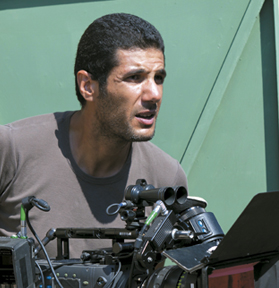 El director y productor marroquí Nabil Ayouch nació en París en 1969. 1997 marcará un hito en su carrera como director, ya que su largometraje Mektoub explota las boleterías marroquíes con más de 350 000 entradas vendidas y recibe la nominación a un óscar en 1998. Le sigue el sensacional éxito de la película Ali Zaoua, Prince de la rue, que ganó más de cuarenta premios. Creó la productora Ali n' Productions para promocionar talentos jóvenes y el GRAP (Grupo de Autores, Directores, Productores) y preside la asociación marroquí para la lucha contra la piratería. La película Les Chevaux de Dieu compitió en la sección “Un Certain Regard” en el Festival de Cannes del año 2012.
El director y productor marroquí Nabil Ayouch nació en París en 1969. 1997 marcará un hito en su carrera como director, ya que su largometraje Mektoub explota las boleterías marroquíes con más de 350 000 entradas vendidas y recibe la nominación a un óscar en 1998. Le sigue el sensacional éxito de la película Ali Zaoua, Prince de la rue, que ganó más de cuarenta premios. Creó la productora Ali n' Productions para promocionar talentos jóvenes y el GRAP (Grupo de Autores, Directores, Productores) y preside la asociación marroquí para la lucha contra la piratería. La película Les Chevaux de Dieu compitió en la sección “Un Certain Regard” en el Festival de Cannes del año 2012.
Moroccan director and producer Nabil Ayouch was born in 1969 in Paris. 1997 will mark a turning point in his career as a director. His feature film Mektoub explodes the Moroccan box office with more than 350,000 entries and is nominated for the Oscar 98. This is followed by the phenomenal success of the movie Ali Zaoua, Prince de la rue which won forty prizes in various festivals. He has created “Ali n' Productions” for promoting young talents, and the GRAP (Group of Authors, Directors, Producers) and chairs the Moroccan association for the Fight against Piracy. Ayouch’s film Les Chevaux de Dieu competed in the “Un Certain Regard” section at the 2012 Cannes Film Festival.
SINOPSIS
¡El cine marroquí en todos sus estadíos!
Nadia Lerguet, guionista, hace hablar a la pequeña familia del cine marroquí dejándolos en un segundo plano.
Moroccan cinema in all its states!
Scriptwriter Nadia Lerguet makes the little family that is Moroccan cinema talk… leaving them in the background.
BIOGRAFÍA
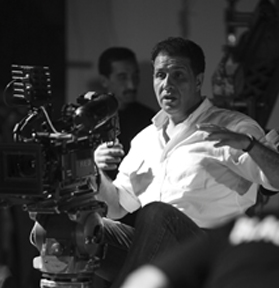 Nacido en Safi; la ciudad que dio al cine marroquí su pionero Mohamed Ousfour y otros tantos grandes directores como Mohamed Reggab, Nour-Eddine Lakhmari estudió ciencia en Marruecos y en Francia antes de embarcarse en la cinematografía en Noruega. Allí realizó cortometrajes que no pasaron por alto para los críticos. Luego de regresar a Marruecos, dirigió su primera película The Gaze en 2004, antes de llegar a los titulares con Casanegra en 2008, un verdadero fenómeno social que llegó a la cima a las boleterías locales. Ahora regresa con Zero y Black Screen.
Nacido en Safi; la ciudad que dio al cine marroquí su pionero Mohamed Ousfour y otros tantos grandes directores como Mohamed Reggab, Nour-Eddine Lakhmari estudió ciencia en Marruecos y en Francia antes de embarcarse en la cinematografía en Noruega. Allí realizó cortometrajes que no pasaron por alto para los críticos. Luego de regresar a Marruecos, dirigió su primera película The Gaze en 2004, antes de llegar a los titulares con Casanegra en 2008, un verdadero fenómeno social que llegó a la cima a las boleterías locales. Ahora regresa con Zero y Black Screen.
Born in Safi; the town that gave Moroccan cinema its pioneer Mohamed Ousfour as well as other great film makers like Mohamed Reggab, Nour-Eddine Lakhmari first studied science in Morocco and France before shifting to cinema in Norway ─where he made shorts that were noticed by the critics. After returning to Morocco, he directed his first feature The Gaze in 2004; before making headlines with Casanegra in 2008, a real social phenomenon that shot to the top of the local box office. He is now back with Zero and Black Screen
SINOPSIS
El Rif, 1975: Amar, de 10 años, vive sólo con su tío violento y alcohólico desde que su madre volvió a casarse en Bélgica. Con Carmen, refugiada española que huyó del franquismo, descubre el cine. Pronto, las primeras tensiones entre Marruecos y España se vislumbran...
El Rif, 1975: Amar, a ten year-old boy, has been living alone with his violent and drunk uncle since his mother got re-married in Belgium. Along Carmen, a Spanish refugee who escaped Francoist Spain, he discovers cinema. Soon the first tensions between Morocco and Spain start surfacing...
BIOGRAFÍA
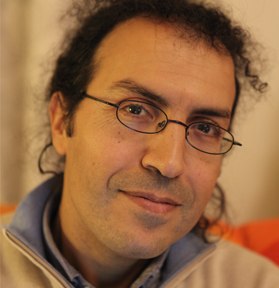 Mohamed Amin Benamraoui nació en Marruecos. Realizó distintos cursos de cine en Bruselas a mediados de los ‘80 y trabajó con numerosos directores belgas como Thierry Zeno. Además, dirigió varios cortos y su trabajo se ha proyectado en festivales de Bélgica y Marruecos. Entre sus cortometrajes están Sellam and Demetan y Wedding on the beach, realizados en 2008, y Kif Kif. Adiós, Carmen es su primer largometraje. Benamraoui también trabajó como conductor de radio y planificador para numerosos festivales bereberes al norte de África.
Mohamed Amin Benamraoui nació en Marruecos. Realizó distintos cursos de cine en Bruselas a mediados de los ‘80 y trabajó con numerosos directores belgas como Thierry Zeno. Además, dirigió varios cortos y su trabajo se ha proyectado en festivales de Bélgica y Marruecos. Entre sus cortometrajes están Sellam and Demetan y Wedding on the beach, realizados en 2008, y Kif Kif. Adiós, Carmen es su primer largometraje. Benamraoui también trabajó como conductor de radio y planificador para numerosos festivales bereberes al norte de África.
Mohamed Amin Benamraoui was born in Morocco and took various cinema courses in Brussels in the mid-80s. He worked with a number of Belgian directors like Thierry Zeno. He has made several short films and his work has been screened in festivals in Belgium and Morocco. His shorts include Sellam and Demetan and Wedding on the beach, which he made in 2008, and Kif Kif. Adios Carmen is his first feature. Benamraoui has also worked as a radio presenter and a programme planner for several Berber festivals.